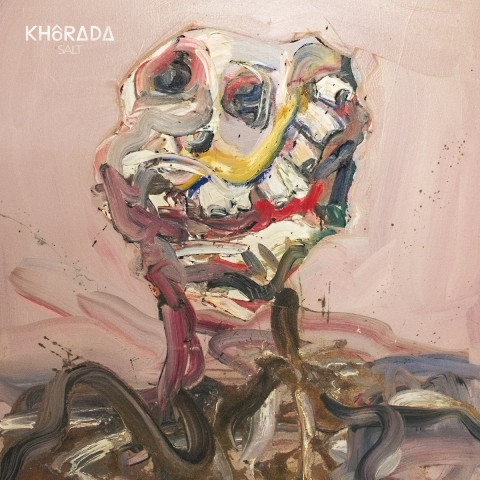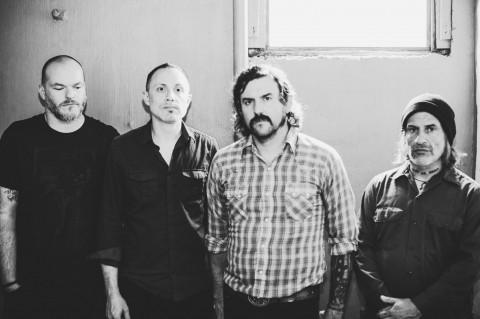"The mix of genres is a symptom of our listening tastes": Interview with Khôrada
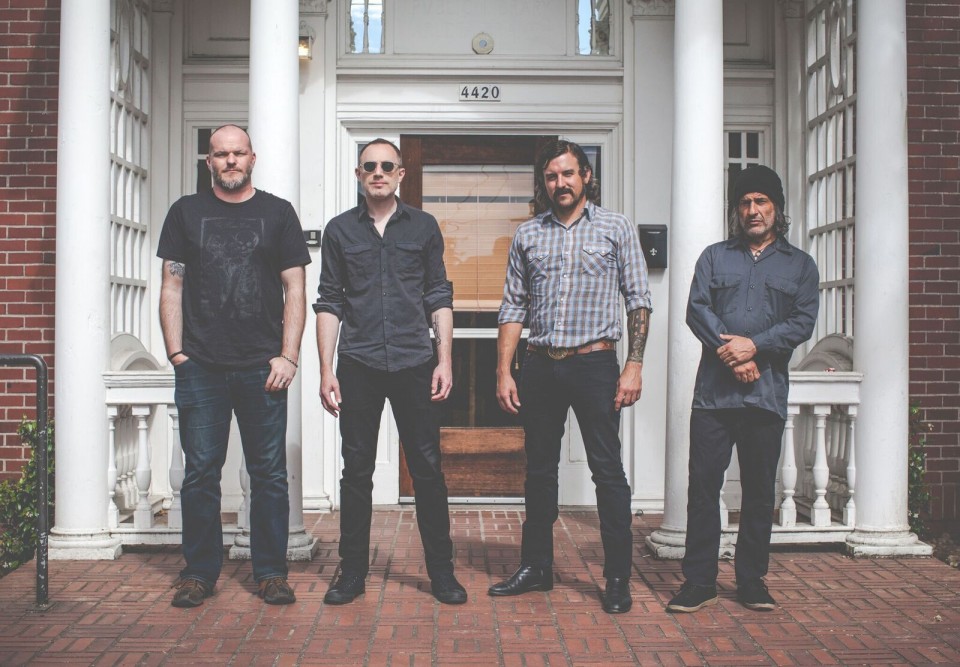
It always seems that the split of a band, particularly the decision of its members to break up despite their already achieved success, is a rather strong kick in the gut; negatively affecting the inspiration and courage to start again from scratch after many years. Nevertheless, history knows many examples when a disbanding turned out to be not a negative phenomenon but a powerful foundation for the very strong and potentially successful projects of its ex-musicians. So in 2016, barely crossing the 20 year mark, the American folk/doom/black metal act Agalloch, who were an archetype for a number of groups across similar genres, suddenly reported their disbanding.
However, those astute fans of Agalloch quickly learned that they wouldn’t be deprived of the talents present in that band with the creation of Khôrada. Don Anderson is back at the helm, bringing the rhythm section from Agalloch with him (Aesop Dekker — drums & Jason Walton — bass), as well recruiting the superb vocalist Aaron Gregory of Giant Squid fame, to round out the band.
In July 2018, Khôrada presented their interesting and extraordinary debut record, multiplying the multifaceted approach of their previous projects. The album, entitled "Salt", was highly rated upon release by critics and music lovers alike. Soon after the release of their debut album, Noizr Zine talked with Khôrada’s members, asking them about the new chapter in their career, studio and concert life, their retirement from previous bands and the influence of music on public opinion.
Your debut album came out this July. The first record, the first reviews... What is it like, after all these years, to turn over a new leaf?
Don Anderson: It’s exciting and has been very rewarding, especially since the record has been received very well by the press. The premier tracks seemed to divide listeners at first, but the overall response has been incredible and I’m very pleased with it. It’s interesting to start over, especially since I never anticipated doing so in my career. I assumed Agalloch was a band I’d be in for many more years. But, obviously not all of us agreed on that.
Aaron John Gregory: It's been especially exciting and still very challenging, but in all the best ways. Starting a new band — especially one that is already taken so seriously from the very start by labels, agents, and the fans of our prior bands — has been a Herculean task to accomplish. We're dealing with things like discovering our sound and how we work together and the logistics of rehearsal; things that I can barely remember having to process all those years ago when Giant Squid started. To be finally on the other end of this project with a completed record in the hands of fans and critics, sitting on shelves in stores across the world, it just seems so surreal; like our first band meeting two years ago was more like ten years ago.
Question to Agalloch’s former members: It seems like after the project’s split-up, despite all these years of activity left behind, you breathed a sigh of relief and much more willingly started to work on Khôrada. Isn’t it?
Don Anderson: It’s more complex than that. I'm very disappointed by how the breakup happened which, to be honest, had everything to do with how John [ex-Agalloch’s guitarist, vocalist John Haughm — Noizr] handled it — and he handled it poorly and with great disrespect to all of us. So, it was not easy to for any of us to go through that. There's relief in the sense that we don't have to put up with that drama anymore. But, Khôrada was borne out of the breakup — it's not like we were going to ever start a side-project with AJ anytime soon. We started the band so we could all continue making music together.
But after 20-some-odd years you can hardly make a completely fresh start because Agalloch has influenced many bands, probably left an imprint on its own members too, hasn’t it? What are the main lessons/techniques you took from Agalloch and applied in working on Khôrada’s record?
Don Anderson: Right, this is true. Agalloch represented a significant output of my songwriting and playing style. So, there will be parts of that in Khôrada. But, in terms of any conscious decisions, I first told everyone that I wanted to continue writing long, epic, and colossal songs with lots of layers — that was something I enjoyed about writing and playing in Agalloch. Now, that could take many forms and sounds because that’s just an approach — it doesn’t say much about how a riff or melody will sound. So, I was open to what that would sound like with AJ’s influence and a fresh clean slate.
In general, Khôrada’s music is fundamentally different from Agalloch. Was it originally the goal to create a fundamentally new sound and mix various genres?
Don Anderson: It was the goal to not outright repeat Agalloch or Giant Squid. We saw this new band as an opportunity to evolve and take new risks as musicians. It would have been a missed opportunity then to repeat the past — even if there were things I wanted to keep from the past. The mix of genres is a symptom of our listening tastes. We all listen to a lot of different music. Also, AJ isn’t a metalhead like the rest of us. Jason [Khôrada’s bassist Jason Walton — Noizr] and I grew up on heavy metal so we know that sound/genre incredibly well. But, AJ is coming from a different background than us. So, that was bound to add something new to the mix.
Aaron John Gregory: I knew from the start this was going to be much different than either of our prior bands. I've said it often now in interviews, but I had no interest in recreating Agalloch, and Giant Squid is the sum of all of its parts, so that wasn't something I could recreate if I wanted to. This was a great challenge for myself personally to see if I could write relevant, powerful music with totally different people than I'd been used to for the last 15 years.
"Salt" was highly appreciated by many journalists, our reviewer, for instance, highlighted the versatility of the album. And how do Khôrada’s members feel about their debut release? Have you implemented all your ideas with this record?
Don Anderson: Yes, I think we are all very satisfied with the album. Sure, there are things we learned that we’ll keep in mind for the next record. But, from the beginning I personally wanted a huge, multilayered, melodic, and rich album and I think we got that.
Aaron John Gregory: Absolutely. I'm terribly proud of this record, but also have a hard time listening to it now after working on it so intensely for the last two years. I'll always hear things I would do differently in listening back to any record I've made. Same thing with my illustration work. I'm constantly looking at my older creative work and thinking about how I could have done it better. All you can do though is take that knowledge with you into the next project.
I must say that I'm especially proud of how versatile and unique "Salt" is. I love hearing one review after another say we were "obviously" influenced by this or that band, none of which I've ever even heard of! As Don explained earlier in this interview, I'm not a metalhead. That doesn't mean I'm clueless! But I had never heard Primordial or Solstafir until seeing Khôrada get compared to them so much, so I went back and checked them out and am really enjoying the music of both!
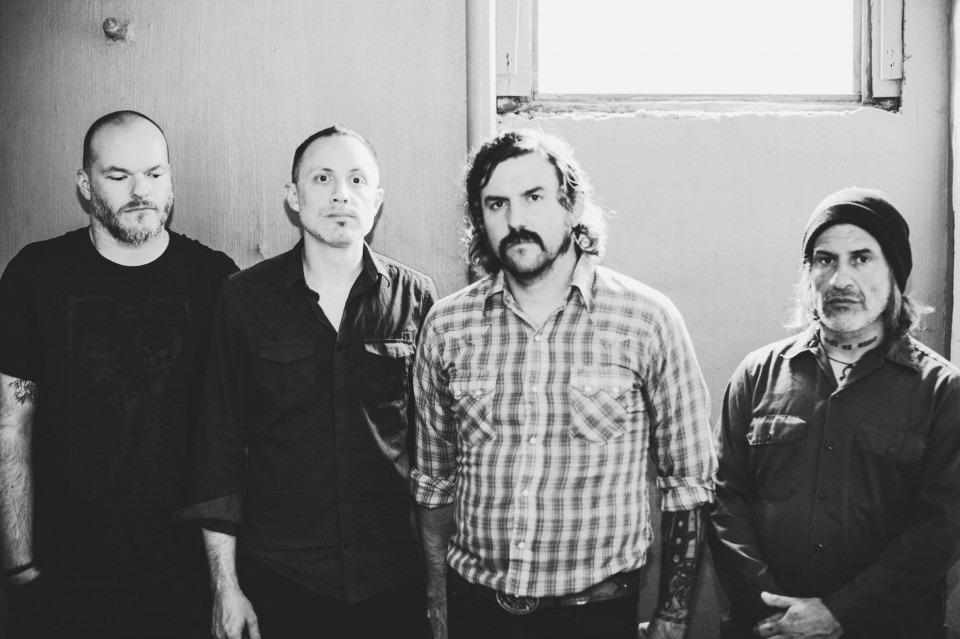
In the description of the record, it was mentioned that "Salt" was "written under the pressure and uncertainty of the beginning of the Trump-era". Was it comfortable for you to work in such conditions?
Don Anderson: Well, it was uncomfortable because many folks in the US and especially our communities are feeling "rage-exhaustion" from Trump policies and of course his childish behavior. An artist always pulls from their environment and I’ve always seen art as a means of working through and reflecting the world one lives in. It seemed unavoidable — if not downright irresponsible — not to consider how the Trump administration has disastrously affected the US and the world at large.
Aaron John Gregory: Trump and the things happening in this country has pretty much consumed my daily thoughts. I've never felt so much anxiety and uncertainty. So much of that stems from being a parent in this insane times. So for me to make an expansive metal album during this tragic era, it was unavoidable for me to write about what I'm seeing; to reflect on what might follow; and to contemplate my role in protecting my family through it all. I grew up listening almost strictly to political punk rock music like the Subhumans, so writing about these things comes as natural to me as anything can.
At the same time, the album does not resemble a cry from the heart or an attempt of encouraging the society to some actions. So what are you trying to convey to the listener first of all? What is the main message of the record?
Don Anderson: Well, it is up to the listener what the message is… although I think we’re pretty clear where we stand and the things we think are important. Part of the album is a way for us to express ourselves at a moment where it is cathartic to do so. But, I also hope that we open up some conversations in the metal scene and encourage others to get politically involved wherever they feel they can do the best work — environmental, work/labor, feminism, Black Lives Matter, supporting the trans community, poverty and so on.
Aaron John Gregory: You're right in that it's a bit cynical. It's more thematically describing what is to follow if we continue on this path. It's not a shout out to stop buying plastic and/or living for profit. It's more a statement of the fact that the damage is done. All we can do now is slow the end so that our children have just a little bit more time to enjoy some semblance of a healthy, balanced, functioning planet.
Do you think that music can change the worldview of people? Today, many musicians put in their lyrics the theme of everyday life in the US, the policy of Trump. Some express their discontent directly, but sometimes it seems that still, music remains music, people listen to it and just go further their way.
Don Anderson: I don’t think we’re going to change the world. But that said, the arts are usually the first thing condemned under fascist regimes — so, clearly they are a threat. I think, again, that we can be successful opening conversations and shedding light on topics for a population that might not be as immediately interested in politics. I remember listening to early Megadeth and Dead Kennedys records and wondering what it was all about. I can also point to the Testament song "Greenhouse Effect" and remember being twelve years old and wondering what that was. So, I looked it up after closely reading the lyrics. So, I think that kind of work is important even if it isn’t going to get Trump impeached or solve poverty.
Aaron John Gregory: The messages in political music changed my life for sure. Bands like Subhumans, Citizen Fish, Conflict, Bad Religion and the Dead Kennedys drastically influenced my perspective on the world. Sure, I still thought for myself and my own informed decisions, but those bands were saying something that you couldn't find anywhere else back in those days, except maybe zines or far left/anarchist literature. I was Vegetarian for nearly twelve years simply because my eyes were really opened to the barbaric ways of the meat industry by songs from the Subhumans or The Smiths.
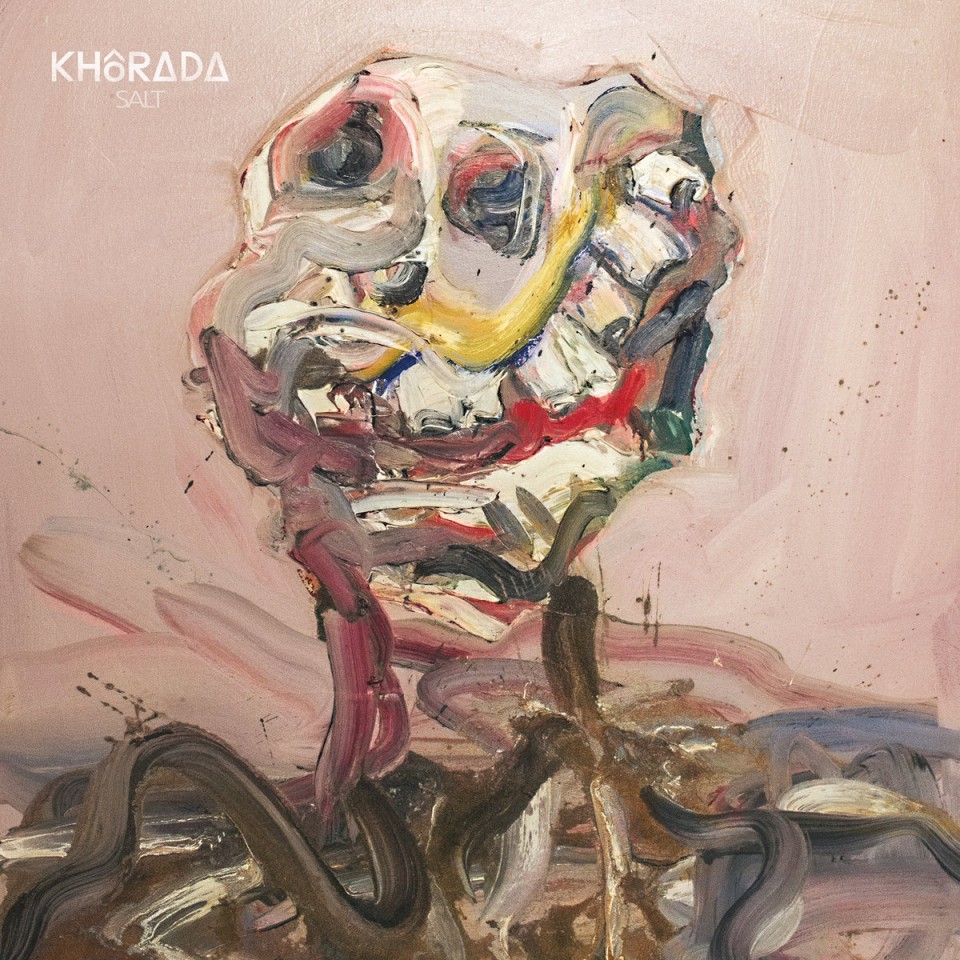
Tell us about your cooperation with the sculptor Cedric Wentworth and the main idea behind the album cover art.
Aaron John Gregory: Cedric Wentworth was a modern art history professor of mine at the Academy of Art, University where I graduated in 2014. I was always so moved by his lectures and insight on fine art and how it directly was influenced by the events of the world. He has a sort of passion and rage that clearly comes out in his art, but was there as well in his lectures. I aced his class the first time around, then sat in on it again the second time just to listen to him speak. We soon became fast friends and have collaborated on many projects together. I've spent many evenings drinking beer in his huge warehouse studio, talking about the world and all the shit that is wrong and right with it; and what job we have as artists to reflect on that. When Khôrada started to discuss what type of imagery we wanted "Salt" to be associated with, Cedric popped in my mind immediately. I'm very happy that the rest of the dudes were so onboard from the first mention.
In one interview, Don Anderson said, "I think part of what made Agalloch successful was that we didn't play live much. We did a lot of special releases". And what plans do you have for Khôrada? Will be there any live shows of the band in the nearest future?
Don Anderson: There will be shows, but we’re not likely going to do long tours. Otherwise, I’ve started putting together ideas for the next album.
Aaron John Gregory: Definitely going to play live, try to do lots of fly out festivals, and some short tours during the summer of 2019. Don and I are both teachers so we have the time available in the summer months in between semesters.
Will Khôrada be the main project for the band’s members?
Don Anderson: For me it is. In a lot of ways it is sort of replacing Agalloch for me. I’ve always had one main band (Agalloch), and then I did other projects like my solo project Sculptured, and I’ve guested on Sol Invictus records. So, Khôrada is taking that main slot in terms of focus and energy.
Aaron John Gregory: It is for me as well, but that's not to say I'm not serious about Squalus, which is certainly a consistently gigging and recording band. We just recorded a new EP entitled "Mass and Power" in June that follows up on our debut, "The Great Fish", and will be released before the end of this year via Translation Loss. We also just did a super mini Pacific North West tour. But Squalus isn't really capable of going out on the road for a couple weeks. Sadly, the crowds wouldn't be there to justify it; not yet at least.
Khôrada on the other hand is already being offered amazing opportunities, so of course I'm going to dedicate a lot of time and resources to taking full advantage of those.
Don, and what about your other project Sculptured? As far as we know, in 2016 the band was already recording its 4th studio album.
Don Anderson: Sculptured is relying primarily on gradual home recording and the contributing players are all recording their parts at their respective homes in Oslo, Portland, and Vancouver as they write them. So, it’s something that is gradually getting recorded and written. I’m taking my time with it. But, I am nearing the end of recording all the parts. Drums, main guitars, and keyboards are all done. Next is vocals. Then mix, master…
In the reviews of "Salt", due to the versatility of the new project, ones are already actively discussing the direction in which Khôrada will move further. Probably, you have your own specific vision, so what can the listeners expect for?
Don Anderson: I’ve really no idea. It’s nice to now have a frame of reference. But, like everything else I’ve written, I’m just gonna sit down and start writing and see what comes out.
Aaron John Gregory: I have ideas, but don't want to say anything because like Don says above, once you sit down and start writing anything can come out. But I'm a big fan of juxtaposing riffs, melodies, and overall different feels on top of each other to create entirely new types of layered styles of heavy music. We did that on Salt, and we're going to do it on the next album as well. But let's just slow down a bit and enjoy "Salt". It only came out less than two weeks ago!
Noizr: Khôrada's new album "Salt" is out now via Prophecy Productions. Order the album here. Follow the band on Facebook.
Interviewed by Yurii Somov
Translated by Anastezia G. and Dan Thaumitan
Noizr Zine thanks Austin Griswold for helping to organize the interview
All photos by Cody Keto
